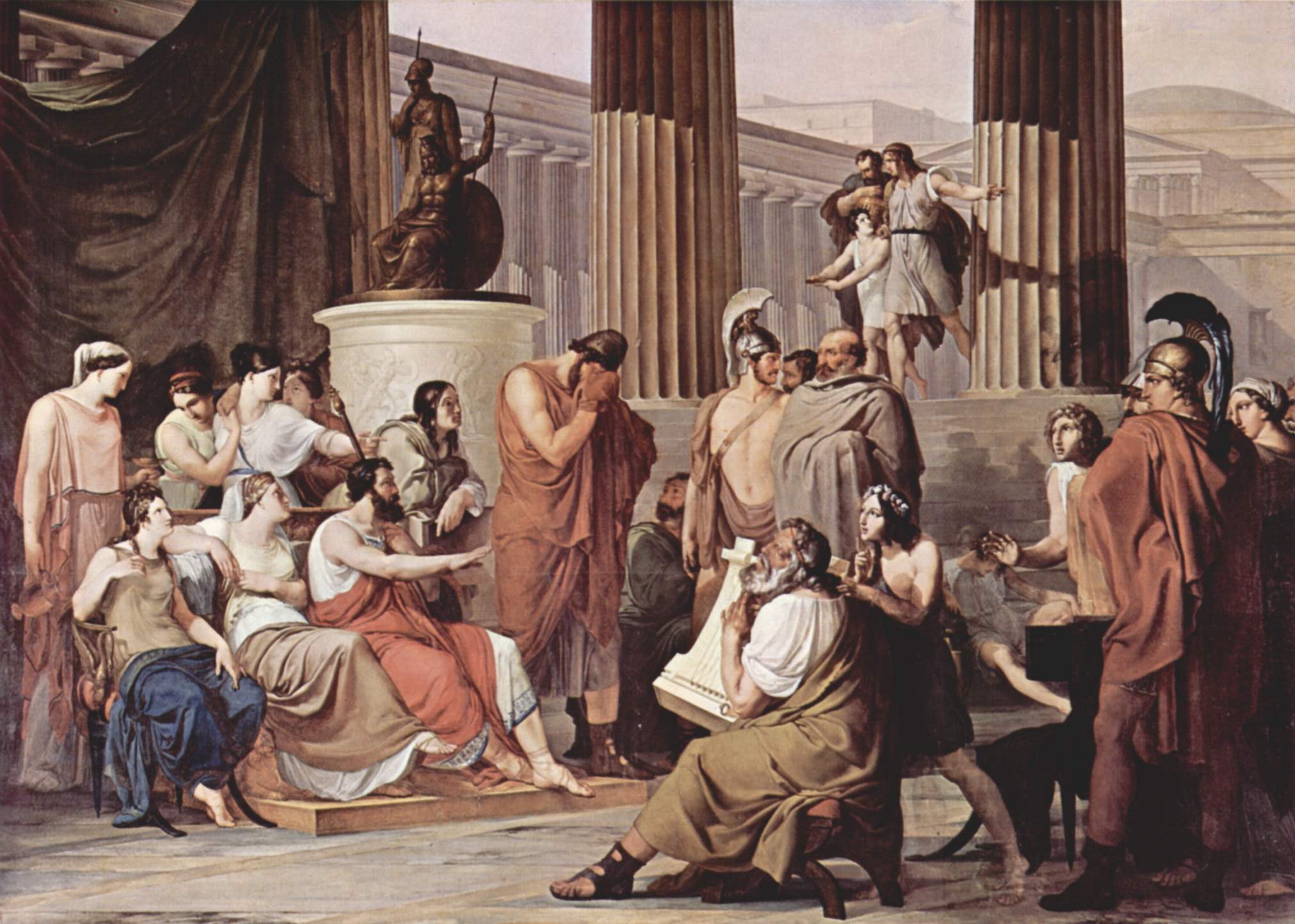Demodocus (Odyssey character) on:
[Wikipedia]
[Google]
[Amazon]
 In the ''
In the ''
 Demodocus first appears at a feast in the hall of
Demodocus first appears at a feast in the hall of
 In the ''
In the ''Odyssey
The ''Odyssey'' (; ) is one of two major epics of ancient Greek literature attributed to Homer. It is one of the oldest surviving works of literature and remains popular with modern audiences. Like the ''Iliad'', the ''Odyssey'' is divi ...
'' by Homer
Homer (; , ; possibly born ) was an Ancient Greece, Ancient Greek poet who is credited as the author of the ''Iliad'' and the ''Odyssey'', two epic poems that are foundational works of ancient Greek literature. Despite doubts about his autho ...
, Demodocus (; ) is a poet who often visits the court of Alcinous
In Greek mythology, Alcinous (also Alcinoüs; ; ''Alkínoos'' ) was a son of Nausithous and brother of Rhexenor. After the latter's death, he married his brother's daughter Arete who bore him Nausicaa, Halius, Clytoneus and Laodamas. In ...
, king of the Phaeacians on the island of Scherie. During Odysseus
In Greek mythology, Greek and Roman mythology, Odysseus ( ; , ), also known by the Latin variant Ulysses ( , ; ), is a legendary Greeks, Greek king of Homeric Ithaca, Ithaca and the hero of Homer's Epic poetry, epic poem, the ''Odyssey''. Od ...
' stay on Scherie, Demodocus performs three narrative songs.
Description
 Demodocus first appears at a feast in the hall of
Demodocus first appears at a feast in the hall of Alcinous
In Greek mythology, Alcinous (also Alcinoüs; ; ''Alkínoos'' ) was a son of Nausithous and brother of Rhexenor. After the latter's death, he married his brother's daughter Arete who bore him Nausicaa, Halius, Clytoneus and Laodamas. In ...
, after he approved that Odysseus
In Greek mythology, Greek and Roman mythology, Odysseus ( ; , ), also known by the Latin variant Ulysses ( , ; ), is a legendary Greeks, Greek king of Homeric Ithaca, Ithaca and the hero of Homer's Epic poetry, epic poem, the ''Odyssey''. Od ...
should be provided with a ship for a safe passage home. During the feast Demodocus sings about the disagreement between Odysseus and Achilles
In Greek mythology, Achilles ( ) or Achilleus () was a hero of the Trojan War who was known as being the greatest of all the Greek warriors. The central character in Homer's ''Iliad'', he was the son of the Nereids, Nereid Thetis and Peleus, ...
at Troy
Troy (/; ; ) or Ilion (; ) was an ancient city located in present-day Hisarlik, Turkey. It is best known as the setting for the Greek mythology, Greek myth of the Trojan War. The archaeological site is open to the public as a tourist destina ...
. Everyone enjoys the singing except for Odysseus who bursts into tears because of the pain and suffering of which the song reminds him. Odysseus would raise his cup and pour libations to the gods every time there was a pause in the singing but when Demodocus began again Odysseus would pull his cloak over his head to hide his tears. Only Alcinous noticed Odysseus' weeping and stopped the feast and suggests that everyone go outdoors to participate in athletic contests.
The games end with dancing and another song from Demodocus. This time he sang of the love between Ares
Ares (; , ''Árēs'' ) is the List of Greek deities, Greek god of war god, war and courage. He is one of the Twelve Olympians, and the son of Zeus and Hera. The Greeks were ambivalent towards him. He embodies the physical valor necessary for ...
and Aphrodite
Aphrodite (, ) is an Greek mythology, ancient Greek goddess associated with love, lust, beauty, pleasure, passion, procreation, and as her syncretism, syncretised Roman counterpart , desire, Sexual intercourse, sex, fertility, prosperity, and ...
. Hephaestus
Hephaestus ( , ; wikt:Hephaestus#Alternative forms, eight spellings; ) is the Greek god of artisans, blacksmiths, carpenters, craftsmen, fire, metallurgy, metalworking, sculpture and volcanoes.Walter Burkert, ''Greek Religion'' 1985: III.2. ...
was Aphrodite's husband and found out about the affair because Helios
In ancient Greek religion and Greek mythology, mythology, Helios (; ; Homeric Greek: ) is the god who personification, personifies the Sun. His name is also Latinized as Helius, and he is often given the epithets Hyperion ("the one above") an ...
told him that he had seen Ares and Aphrodite lying together. Hephaestus sets up an inescapable trap over his bed. When Ares and Aphrodite go to bed, they are snared in the trap and caught by Hephaestus. At dinner, after the sun had gone down, Odysseus asks Demodocus to sing his third song. Odysseus cut off a sizable piece of pork from his own portion and told a herald to bring it to Demodocus. Demodocus was grateful and began to sing. He sang of the Trojan horse and the sack of Troy. Again, Odysseus weeps uncontrollably and is able to hide it from everyone except Alcinous who ends the singing and asks Odysseus who he really is.
Demodocus is described as blind: "The squire now came, leading their favorite bard, whom the Muse
In ancient Greek religion and Greek mythology, mythology, the Muses (, ) were the Artistic inspiration, inspirational goddesses of literature, science, and the arts. They were considered the source of the knowledge embodied in the poetry, lyric p ...
loved above all others, lhough she had mingled good and evil in her gifts, robbing him of his eyes but granting him the gift of sweet song."Homer. ''Odyssey'', 8.62–67, (translated by E.V. and D.C.H. Rieu).
Namesake
* 11429 Demodokus, Jovian asteroidReferences
{{DEFAULTSORT:Demodocus (Odyssey Character) Characters in the Odyssey Musicians in Greek mythology